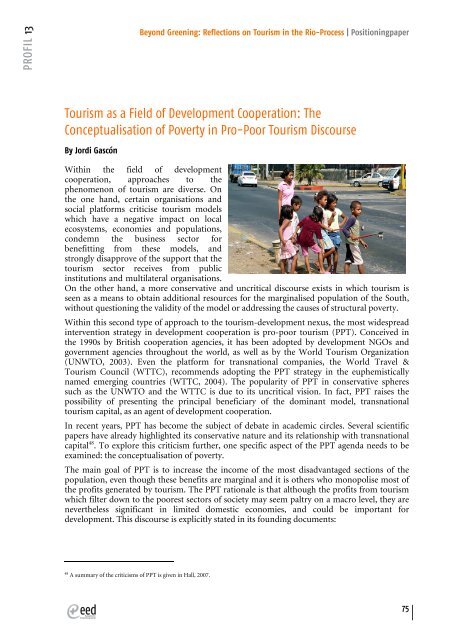Beyond Greening - Tourism Watch
Beyond Greening - Tourism Watch
Beyond Greening - Tourism Watch
Create successful ePaper yourself
Turn your PDF publications into a flip-book with our unique Google optimized e-Paper software.
<strong>Beyond</strong> <strong>Greening</strong>: Reflections on <strong>Tourism</strong> in the Rio-Process | Positioningpaper<strong>Tourism</strong> as a Field of Development Cooperation: TheConceptualisation of Poverty in Pro-Poor <strong>Tourism</strong> DiscourseBy Jordi GascónWithin the field of developmentcooperation, approaches to thephenomenon of tourism are diverse. Onthe one hand, certain organisations andsocial platforms criticise tourism modelswhich have a negative impact on localecosystems, economies and populations,condemn the business sector forbenefitting from these models, andstrongly disapprove of the support that thetourism sector receives from publicinstitutions and multilateral organisations.On the other hand, a more conservative and uncritical discourse exists in which tourism isseen as a means to obtain additional resources for the marginalised population of the South,without questioning the validity of the model or addressing the causes of structural poverty.Within this second type of approach to the tourism-development nexus, the most widespreadintervention strategy in development cooperation is pro-poor tourism (PPT). Conceived inthe 1990s by British cooperation agencies, it has been adopted by development NGOs andgovernment agencies throughout the world, as well as by the World <strong>Tourism</strong> Organization(UNWTO, 2003). Even the platform for transnational companies, the World Travel &<strong>Tourism</strong> Council (WTTC), recommends adopting the PPT strategy in the euphemisticallynamed emerging countries (WTTC, 2004). The popularity of PPT in conservative spheressuch as the UNWTO and the WTTC is due to its uncritical vision. In fact, PPT raises thepossibility of presenting the principal beneficiary of the dominant model, transnationaltourism capital, as an agent of development cooperation.In recent years, PPT has become the subject of debate in academic circles. Several scientificpapers have already highlighted its conservative nature and its relationship with transnationalcapital 48 . To explore this criticism further, one specific aspect of the PPT agenda needs to beexamined: the conceptualisation of poverty.The main goal of PPT is to increase the income of the most disadvantaged sections of thepopulation, even though these benefits are marginal and it is others who monopolise most ofthe profits generated by tourism. The PPT rationale is that although the profits from tourismwhich filter down to the poorest sectors of society may seem paltry on a macro level, they arenevertheless significant in limited domestic economies, and could be important fordevelopment. This discourse is explicitly stated in its founding documents:48A summary of the criticisms of PPT is given in Hall, 2007.75












